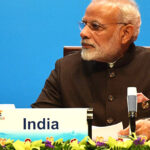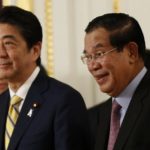
The international community has all but abandoned support for Cambodia’s national elections, scheduled for July 29. A string of events have outraged Western governments and unnerved already strained relations. Last September, the Hun Sen-led government arrested opposition leader and Cambodia National Rescue Party (CNRP) president Kem Sokha, a tainted Supreme Court dissolved the CNRP a month later and banned 118 opposition leaders from politics for up to five years. These events have helped solidify international opposition to democratic backsliding–with the exception of Japan.

When more than 40 countries signed a joint statement at the United Human Rights Council condemning political repression in Cambodia, Japan was not among them. Prime Minister Shinzo Abe has kept quiet in the face of international and domestic criticism, hoping to strike a middle ground between Cambodia and its biggest benefactor, Beijing. Traditionally, Japan has marched in lockstep with the United States, reactive to political headwinds, but Cambodia provides a case study where Japanese foreign policy remains resilient and relatively independent.
Part of this independence is the direct result of past diplomatic success. After Vietnam invaded Cambodia, Tokyo used a successful strategy of building a relationship with both Phnom Penh and Hanoi, whereas the Americans and Chinese aimed to alienate the Vietnamese. The Chinese saw the invasion as a cover for Soviet expansion and the war weary Americans sought to minimize Communist influence through improved relations with the Khmer Rouge. China sought to isolate Vietnam from the rest of ASEAN, but Japan chose to engage–even with the Khmer Rouge. It saw Southeast Asia as a source of natural resources, as well as a means of boosting its status in the eyes of the international community. Japan saw an opportunity to assume larger international responsibilities worthy of the stature of a major economic power.
When ‘checkbook’ diplomacy resulted in ‘humiliation’ in the Persian Gulf, success in Cambodia was paramount to reclaiming lost credibility with the United States. Japan’s contribution to the UNTAC peacekeeping mission, which included civilian police, ceasefire monitoring, and electoral assistance were first steps toward rebuilding Japan’s international stature. Japan’s presence in Cambodia well before other actors were willing to engage with the major factions proved beneficial in a post-UNTAC Hun Sen era. In February, Japan donated 10,000 ballot boxes ahead of the July 2018 National Elections. The boxes, worth $7.5 million were among many contributions to Cambodia, but symbolized something important to Phnom Penh. As National Election Committee (NEC) Chairman Sik Bun Hok told journalists, “Our Japanese friends have never abandoned us.”
Japan’s support for the Cambodian national elections is also directly related to its continued investment in the country. Since 1992, Japan has been the largest contributor to Cambodia, pouring in more than $2 billion in official development assistance (ODA). A special emphasis has been placed on infrastructure, a skill the Japanese are particularly adept at. Infrastructure has been a primary concern for Hun Sen, who has sought both Japanese and Chinese investments. Last year, Hun Sen asked Japan to invest $800 million in a skytrain system in Phnom Penh. Overall, the Japanese investment in Cambodia, across sectors cannot be underestimated. In 2017, Japanese investment was valued at over $1.7 billion, according to the Council for the Development of Cambodia (CDC). These investments are not new developments. Japan has a long history of investments in Cambodia that date back to their early success in brokering a peace agreement.
Japan’s short-term interests in the July elections are less important than the long-term strategy of engagement in Cambodia. The Japanese government told RFA that while Japan was monitoring the situation closely, the official position is to provide electoral reform assistance that promotes democratization in the medium and long term. An abrupt policy change critical of Hun Sen would damage diplomatic relations in the short term and provoke a knee jerk reaction toward Beijing. Abe does not want a repeat of Cambodia’s response to Western criticism, where agencies were expelled and hostilities were exchanged. Conventional wisdom suggests that China’s recent investments have given it a clear advantage over Japan, but that does not suggest that circumstances would not change. Cambodia, like its neighbors along the Mekong Delta, have begun questioning the wisdom of becoming beholden to China. Biding its time and nurturing the present relationship will afford it opportunities in the future.






